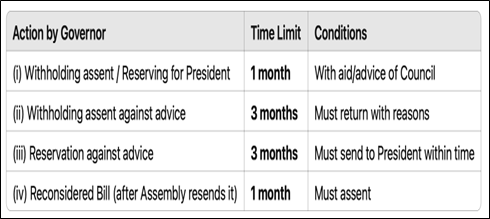PREVIOUS
Supreme Court's deadline on President
April 15 , 2025
11 hrs 0 min
50
0
- The Supreme Court has put the President on a three-month deadline to decide whether or not to assent to State Bills referred to her by a Governor.
- The count begins from the day the Governor referred the Bill to the President for her consideration.
- In case of any delay beyond this period the appropriate reasons would have to be recorded and conveyed to the State concerned.
- The States, in turn, must be cooperative to any queries or suggestions from the Centre on the Bills.
- The President ought to, as a measure of prudence, seek the Supreme Court’s advice on the Bills reserved by a Governor for her consideration on grounds of perceived unconstitutionality.
- If there is no action by the president within the time limit, then the state can file writ petitions such as mandamus against the president.
- The President cannot exercise absolute veto on state bill under article 201, The judgement paves the way for restoring a ‘lapsed’ Bill.
- As per the Constitution, once the Bill has been returned, or assent to it withheld by the President, the legislation lapses.
- It has to be reintroduced in the Assembly for the passage, with the amendments suggested or without, as desired by the Assembly.
- The April 8 judgement does not consider this ground.

Leave a Reply
Your Comment is awaiting moderation.


